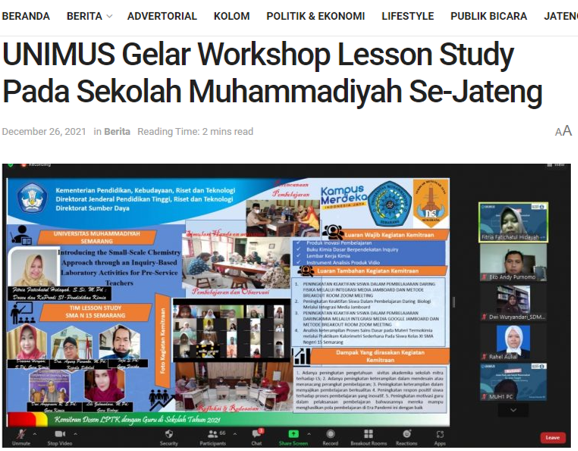Improving the quality of learning through strengthening the lesson study community based on "Competition exploration"
DOI:
https://doi.org/10.22219/jcse.v3i3.19456Keywords:
Competition exploration , Lesson Study for Learning Community, Quality of learningAbstract
Key Performance Indicators no. 7 provide direction for the application of problem-solving learning methods, and recommend implementing project-based group learning (team-based projects). Implementation of collaborative learning activities can be carried out through the Lesson Study for Learning Community method. Collaboratively, all existing LS teams carry out planning, observation, and reflection. This activity was aimed to analyze the improvement of the quality of collaborative learning in lesson study communities in Muhammadiyah schools throughout Central Java based on "Competition Exploration". Implementation of activities in the field begins with Lesson Study workshops, learning models, writing scientific articles and IPR. In order to strengthen the article writing skills for teachers of the Lesson Study Team at Muhammadiyah schools throughout Central Java, this community service activity was followed up with a safari in 6 residencies in Central Java. The activity emphasizes assisting in writing scientific articles and submitting IPRs. From this assistance, 40 scientific articles and 40 HKI proposals, 40 lesson designs, and learning videos were produced. The community service team has produced 1 scientific article in the field of service, and 18 news articles in the mass media. Thus, this activity was successfully implemented and there was an increase in the quality of collaborative learning in the lesson study community.
Downloads
References
BAPPENAS. (2022). 8. Pekerjaan Layak dan Pertumbuhan Ekonomi. SDGs. https://sdgs.bappenas.go.id/tujuan-8/
Dirjen Pendidikan Tinggi. (2020). Buku Panduan MBKM. In Buku Panduan Merdeka Belajar-Kampus Merdeka. Ditjen Dikti Kemendikbud. https://dikti.kemdikbud.go.id/wp-content/uploads/2020/05/Buku-Panduan-Merdeka-Belajar-Kampus-Merdeka-2020-1.pdf
Graesser, A. C., Fiore, S. M., Greiff, S., Andrews-Todd, J., Foltz, P. W., & Hesse, F. W. (2018). Advancing the Science of Collaborative Problem Solving. Psychological Science in the Public Interest, 19(2), 59–92. https://doi.org/10.1177/1529100618808244
Griffin, P., Care, E., & McGaw, B. (2011). The Changing Role of Education and Schools. In Assessment and Teaching of 21st Century Skills (pp. 1–15). Springer. https://doi.org/10.1007/978-94-007-2324-5_1
Handayani, R. D., Wilujeng, I., Prasetyo, Z. K., & Triyanto. (2019). Building an indigenous learning community through lesson study: challenges of secondary school science teachers. International Journal of Science Education, 41(3), 281–296. https://doi.org/10.1080/09500693.2018.1548789
Hendayana, S. (2007). Lesson Study suatu strategi untuk meningkatkan keprofesionalan pendidik (pengalaman IMSTEP - JICA). Bandung FP MIPA UPI dan JICA. https://onesearch.id/Record/IOS14006.INLIS000000000054118
Holden, M. (2022). Exploring online lesson study as a vehicle for teacher collaborative professional learning. International Journal for Lesson and Learning Studies. https://doi.org/10.1108/IJLLS-01-2022-0012
Miharja, F. J., Nurwidodo, N., Wahyuningrum, L., Iffah, A. H., & Eskasasnanda, I. D. P. (2020). Tokkatsu: Initiating students’ collaborative activities in lesson study piloting school. Jurnal Pendidikan Progresif, 10(1), 63–72. https://doi.org/10.23960/jpp.v10.i1.202008
Nurwidodo, N., Hendayana, S., Hindun, I., & Sarimanah, E. (2018). Strategies for establishing networking with partner schools for implementing lesson study in Indonesia. JPBI (Jurnal Pendidikan Biologi Indonesia), 4(1), 11–22. https://doi.org/10.22219/jpbi.v4i1.5489
Oliveri, M. E., Lawless, R., & Molloy, H. (2017). A Literature Review on Collaborative Problem Solving for College and Workforce Readiness. ETS Research Report Series, 2017(1), 1–27. https://doi.org/https://doi.org/10.1002/ets2.12133
Pásztor-Kovács, A., Pásztor, A., & Molnár, G. (2021). Measuring collaborative problem solving: research agenda and assessment instrument. Interactive Learning Environments, 1–21. https://doi.org/10.1080/10494820.2021.1999273
Pribadi, R. E. (2017). Implementasi Sustainable Development Goals (SDGs) Dalam Meningkatkan Kualitas Pendidikan Di Papua. EJournal Ilmu Hubungan Internasional, 5(3), 917–932.
Rahmawan, S., Hendayana, S., Hernani, H., & Rahayu, D. S. (2019). Exploring the effect of reflection to inquiry teaching through lesson study for learning community. Journal of Physics: Conference Series, 1157(2). https://doi.org/10.1088/1742-6596/1157/2/022039
Richit, A., da Ponte, J. P., & Tomasi, A. P. (2021). Aspects of Professional Collaboration in a Lesson Study. International Electronic Journal of Mathematics Education, 16(2), em0637. https://doi.org/10.29333/iejme/10904
Rieckmann, M. (2017). Education for sustainable development goals: Learning objectives. UNESCO Publishing.
Rosdiyani, T., Artiwi, N. P., Purnawan, P., Hendra, Y., Nasri, E., Widyawati, W., Nuraida, I., Hidayanti, N., Solihati, T. I., Ansoriyah, S., Maulida, H. F., Amilia, E., Rifai, A., Surahmat, A., Fu, T. D., Suhendar, B., Khairusy, M. A., Atmaja, S., Febriani, R., … Apriliansyah, R. (2021). Changing trends pendidikan tinggi pada kampus merdeka (Gagasan konstruksi dan paradigma MBKM) (F. Fitriyah, M. K. Abadi, & F. Oktaviana (eds.)). Media Madani. https://elibrary.unikom.ac.id/id/eprint/4472/1/MBKM_UNBAJA-21-pages-1-13,192-209.pdf
Saito, E., Watanabe, M., Gillies, R., Someya, I., Nagashima, T., Sato, M., & Murase, M. (2015). School reform for positive behaviour support through collaborative learning: utilising lesson study for a learning community. Cambridge Journal of Education, 45(4), 1–30. https://doi.org/10.1080/0305764X.2014.988684
UNESCO. (2017). Education for sustainable development goals learning objectives. UNESCO Education Sector.
Winaryati, E., Mardiana, & Hidayat, M. T. (2020). Conceptual framework of evaluation model on 4 c’s-based learning supervision. International Journal of Learning, Teaching and Educational Research, 19(8), 173–193. https://doi.org/10.26803/ijlter.19.8.10

Downloads
Published
How to Cite
Issue
Section
License
Copyright (c) 2022 Eny Winaryati, S. Safuan, Dodi Mulyadi, Muthia Hasan, Nurunnisa Hanif Wijanarko, Feri Reiza Maulana, Marvina Irma Ivana, Moch. Khoirul Anam

This work is licensed under a Creative Commons Attribution-ShareAlike 4.0 International License.












